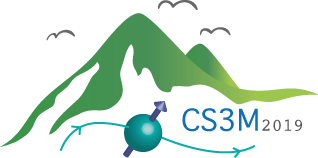Tutorials
Tutorials are mini-courses of 3h each that aims for a very specific subject on the area of magnetism. More information soon about cost and schedule. The tutorials will be held at ECCI University.
1. Monday December 2nd 9:00 am - Fundamentals of microrobotics and magnetic manipulation at small scale - by Dr. Camilo Vélez, Mechanical Engineering Department, Carnegie Mellon University, USA.
Abstract: Like colonies of ants or bees, it is conceivable for coordinated “swarms” of small-scale robots to together solve complex tasks, such as micro/nanomanufacturing, biomedical treatments (e.g., direct cell manipulation, minimal invasive medicine, theranostics, etc.), monitor and maintenance of structures, or surveillance and information security. In the last few years, researchers have demonstrated significant advancements along this theme, including locomotion (magnetic, flaying, swimming), multiple robot manipulation, chemical actuation, and human in-vivo experimentation. However, to fully realize this futuristic vision, the microrobot units must be made smaller, smarter, cheaper, and more capable than anything seen before. This tutorial on engineering advancements to solve technological challenges in the field of microrobotics will have a special emphasis on magnetic locomotion at microscale, while addressing the state-of-the-art of fabrication techniques for such fascinating microsystems.
2. Monday December 2nd 11:00 am - Functionalization of Magnetic Nanocompounds for their use in the Pharmaceutical, Chemical, Biological and Material industries - by Johann Osma, Department of Electronic Engineering, Universidad de los Andes.
Abstract: In this tutorial session, different methods for the synthesis of magnetic nanoparticles and their challenges for an industrial scale up are introduced. In addition, self-assembling surface functionalizations are shown as examples of their potential use for different industries. In particular, real functionalized nanocompounds, targeted to different industrial segments, are detailed; while the presence of magnetic properties are going to be analyzed as a differential factor in the industrial application of nanocompounds.
Download current event:
Calendar file
In order to enable an iCal export link, your account needs to have an API key created. This key enables other applications to access data from within Indico even when you are neither using nor logged into the Indico system yourself with the link provided. Once created, you can manage your key at any time by going to 'My Profile' and looking under the tab entitled 'HTTP API'. Further information about HTTP API keys can be found in the Indico documentation.
Additionally to having an API key associated with your account, exporting private event information requires the usage of a persistent signature. This enables API URLs which do not expire after a few minutes so while the setting is active, anyone in possession of the link provided can access the information. Due to this, it is extremely important that you keep these links private and for your use only. If you think someone else may have acquired access to a link using this key in the future, you must immediately create a new key pair on the 'My Profile' page under the 'HTTP API' and update the iCalendar links afterwards.
Permanent link for public information only:
Permanent link for all public and protected information:
Please use CTRL + C to copy this URL
Detailed timetable

